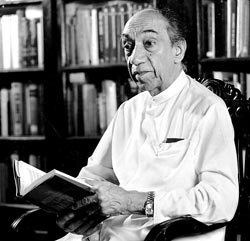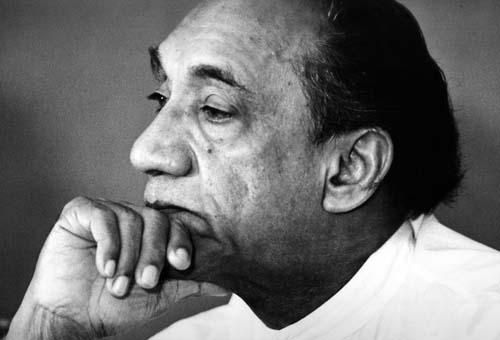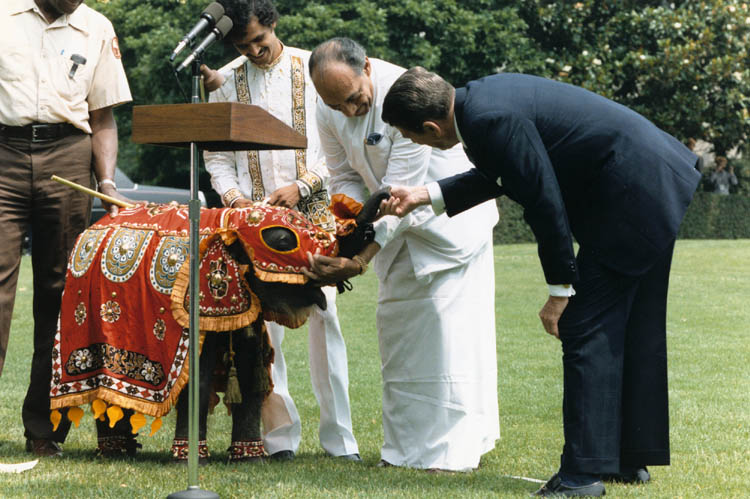<Back to Index>
- Rocket Scientist Konstantin Eduardovich Tsiolkovsky, 1857
- Writer Gottlieb Wilhelm Rabener, 1714
- 2nd President of Sri Lanka Junius Richard Jayewardene, 1906
PAGE SPONSOR


Junius Richard Jayewardene (Sinhala:ජුනියස් රිචඩ් ජයවර්ධන) (September 17, 1906 – November 1, 1996), famously abbreviated in Sri Lanka as JR, was the first executive President of Sri Lanka, serving from 1978 till 1989. He was a leader of the nationalist movement in Ceylon (now Sri Lanka) who served in a variety of cabinet positions in the decades following independence. Before taking over the newly created executive presidency, he served as the Prime minister of Sri Lanka between 1977 and 1978.
J.R. Jayewardene, who was the eldest in a family of 11 children, was the son of Hon. Justice Eugene Wilfred Jayewardene KC a Chief Justice of Ceylon. Educated at the prestigious Royal College, Colombo, where he played for the college cricket team, debuting in the Royal - Thomian series in 1925 and captained rugger team at the annual Royal - Trinity Encounter which later became known as the Bradby Shield Encounter. Excelling in both studies and sports, he became the head prefect in 1925 and also represented the school in football, boxing and was a member of the cadet corp.
Jayewardene entered the University College, Colombo in 1926 where he attaining a distinguished academic record and showed a keen interest in sports. In 1928 he entered Colombo Law College and graduated as an advocate, starting his practice in the unofficial Bar, for a brief period. Jayewardene converted from Christianity to Buddhism in his youth.
Jayewardene did not practice law for long, however. In 1938 he became an activist in the Ceylon National Congress (CNC), which provided the organizational platform for Ceylon's nationalist movement (the island was officially renamed Sri Lanka in 1972). He became its Joint Secretary in 1940. He was elected to the colonial legislature, the State Council in 1943 by wining the Kelaniya by-election. During World War II, Jayewardene, along with other nationalists, contacted the Japanese and discussed a rebellion to drive the British from the island.
After joining the United National Party on its formation in 1946, he became Finance Minister in the island’s first Cabinet in 1947. He played a major role in re-admitting Japan to the world community at the San Francisco Conference.
Jayewardene's acute intelligence and subtle, often aggressive political skills earned him leading roles in government (1947 – 1956 and 1965 – 1970) and in opposition (1956 – 1965 and 1970 – 1977). In 1951 Jayewardene was a member of the committee to select a National Anthem for Sri Lanka headed by Sir Edwin Wijeyeratne. The following year he was elected as the President of the Board of Control for Cricket in Ceylon.
As the youngest Finance Minister, in D.S. Senanayake's government, Jayewardene struggled to balance the budget, faced with mounting government expenditures, particularly for rice subsidies. His 1953 proposal to cut the subsidies - on which many poor people depended on for survival - provoked fierce opposition and the 1953 Hartal campaign, and had to be called off.
By the late 1950s, the UNP struggled to deal with the rising force of the Sinhala nationalist Sri Lanka Freedom Party. Jayewardene pushed the party to accommodate nationalism and endorse the Sinhala Only Act, which was bitterly opposed by the island's minorities. Throughout the 1960s Jayewardene clashed over this issue with party leader Dudley Senanayake. Jayewardene saw how skilfully the SLFP had played the ethnic card, and felt the UNP should be willing to do the same, even if it meant losing the support of ethnic minorities.
No government gave serious thought to the development of the industry as an economically viable venture until the United National Party came to power in 1965 and the subject of tourism came under the purview of the Minister of State Hon. J.R. Jayewardene.
The
new Minister Jayewardene saw tourism in a new dimension as a great
industry capable of earning foreign exchange, providing avenues of mass
employment, creating a manpower which commanded a high, employment
potential in the world. He was determined to place this industry on a
solid foundation providing it a 'conceptional base and institutional
support.' This was necessary to bring dynamism and cohesiveness into an
industry, shunned by leaders in the past, ignored by investors who were
inhibited by the lack of incentive to invest in projects which were
uncertain of a satisfactory return. The new Minister Hon. J.R.
Jayewardene considered it essential for the government to give that
assurance and with this objective in view he tabled the Ceylon Tourist
Board Act No 10 of 1966 followed by Ceylon Hotels Corporation Act No 14
of 1966. This
was the beginning of a new industry ignored by the previous governments
but given a new life by Minister J.R. Jayewardene. As a result today
tourist resorts exist in almost all cities and today an annual turnover
of over 500,000 tourists are enjoying the tropical climes and beautiful
beaches of Sri Lanka not to mention the enormous amount of foreign
exchange they bring into the country. In
the general election of 1970 the UNP suffered a major defeat, when the
SLFP and its newly formed collation of leftist parties won almost 2/3
of the parliamentary seats. Once again elected to parliament J.R.
Jayewardene took over as opposition leader and de-facto leader of the
UNP due to the ill health of Dudley Senanayake. After Senanayake's
death in 1973, Jayewardene succeeded him as UNP leader. He gave the
SLFP government his fullest support during the 1971 JVP Insurrection (even
though his son was arrested by the police without charges) and in 1972
when the new constitution was enacted proclaiming Ceylon a republic.
However he opposed the government in many moves, which he saw as short
sighted and damaging for the country's economy in the long run. These
included the adaptation of the closed economy and nationalization of
many private business and lands. In 1976 he resigned from his seat in
parliament in protest, when the government used its large majority in
parliament to extend the duration of the government by two more years
at the end of its six year term without holding a general election or a
referendum requesting public approval. Jayewardene
won a sweeping election victory in 1977 to become Prime Minister.
Immediately thereafter, he amended the first republican constitution of
1972 and created the post of executive president. Provisions were
included in it which made him President without an election. He swore
as the President on 4 February 1978. He passed a new constitution on 31
August 1978 which came into operation on 7 September of the same year.
It retained the Executive Presidency with drastic and unchecked powers,
and, on its adoption into law, continued him as the first Sri Lankan
Executive President. He moved the legislative capital from Colombo to Sri Jayawardanapura Kotte.
He opened the heavily state controlled economy to market forces, which
many credit with subsequent economic growth but also with greater
divisions in society. After the 1977 riots, the government made one concession to the Tamils; it lifted the policy of standardization for
university admission that had driven many Tamil youths into militancy.
The concession was regarded by the militants as too little and too
late, and violent attacks continued. Jayewardene moved to crack down on the growing activity of Tamil militant groups. He passed the Prevention of Terrorism Act in
1979, giving police sweeping powers of arrest and detention. This only
escalated the ethnic tensions. Jayewardene claimed he needed overwhelming power to deal with the militants. He had likely SLFP
presidential nominee Sirimavo Bandaranaike stripped
of her civic rights and barred from running for office for six years,
based on her decision in 1976 to extend the life of parliament. This
ensured that the SLFP would be unable to field a strong candidate
against him in the 1982 election,
leaving his path to victory clear. This election was held under the 3rd
amendment to the constitution which empowered the president to hold a
Presidential Election anytime after the expiration of 4 years of his
first term. The UNP had obtained an overwhelming majority in the 1977 elections,
and Jayewardene was loth to part with it. He therefore held a
referendum to cancel the 1983 parliamentary elections, and allow the
1977 parliament to continue until 1989. He also passed a constitutional
amendment barring from Parliament any MP who supported separatism; this effectively eliminated the main opposition party, the Tamil United Liberation Front. Jayewardene said in Daily Telegraph, 11th July 1983," Really if I starve the Tamils out, the Sinhala people will be happy." At first, the war went badly for the government, and the LTTE ended up in possession of Jaffna and
most of the northern province. The army counter attacked with an
offensive that threatened to retake the city, at the cost of many
civilian casualties. Jayewardene had to halt the offensive after
pressure from India pushed for a negotiated solution to the conflict. Jayewardene and Indian Prime Minister Rajiv Gandhi finally concluded the Indo - Sri Lanka Accord, which provided for devolution of powers to Tamil dominated regions, an Indian peacekeeping force in the north, and the demobilization of the LTTE. The
LTTE rejected the accord, as it fell short of even an autonomous
state. The provincial councils suggested by India were the ones that
did not even have powers of control over revenue, police, or government
sponsored Sinhala settlements
in Tamil provinces. Sinhala nationalists were outraged by both the
devolution and the presence of foreign troops on Sri Lankan soil. An attempt was made on Jayawardene's life in 1987 as a result of his signing of the accord. Young, deprived Sinhalese soon rose in revolt, organized by the Janatha Vimukthi Peramuna (JVP) which was eventually put down by the government. Jayewardene retired from politics in 1989; his successor Ranasinghe Premadasa was formally inaugurated on 2 January 1989. On
the economic front, Jayewardene's legacy was decisive. For thirty years
after independence, Sri Lanka had struggled in vain with slow growth
and high unemployment. Since Jayewardene's reforms, the island has
maintained healthy growth despite the civil war. On
the ethnic question, Jayewardene's legacy is bitterly divisive. When he
took office, ethnic tensions were present but the country as a whole
was at peace. By the end of his tenure, Sri Lanka was facing not one
but two civil wars, both featuring unprecedented levels of violence and
brutality. Though
Jayewardene indeed did not take measures to stop the attack on Tamils,
he was not opposed to them personally, only politically. He was not a racist but
rather a man who knew how to exploit racism to win the majority.
Jayewardene
married Miss Elina Bandara Rupasinghe in 1935, Ravindra "Ravi" Vimal
Jayewardene is their only child, he was an Officer in the
Sri Lanka Army and served as the Presidential Security Adviser. He was a notable marksman, pilot and the founder of the elite Special Task Force.
Quite contrary to his predecessor, Sirima Bandaranaika, Jayawardena's foreign
policy was aligned with American policies (earning him the nickname 'Yankie
Dickie') much to the chagrin of India. Before Jayawardena's ascendency
into the presidency, Sri Lanka had its doors widely open to its
neighbourhood India. Jayawardena's tenure in the office restricted the
doors to India a number of times; once an American company tender was
granted over an Indian company tender.
